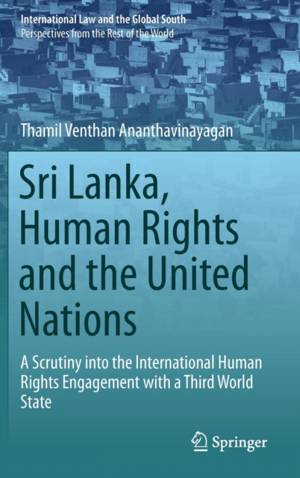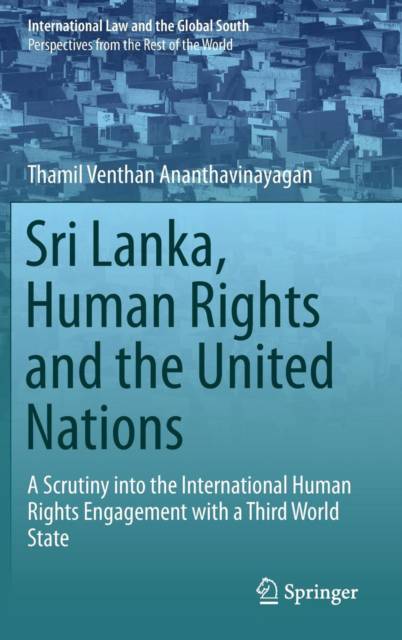
- Retrait gratuit dans votre magasin Club
- 7.000.000 titres dans notre catalogue
- Payer en toute sécurité
- Toujours un magasin près de chez vous
- Retrait gratuit dans votre magasin Club
- 7.000.0000 titres dans notre catalogue
- Payer en toute sécurité
- Toujours un magasin près de chez vous
Sri Lanka, Human Rights and the United Nations
A Scrutiny Into the International Human Rights Engagement with a Third World State
Thamil Venthan Ananthavinayagan
198,45 €
+ 396 points
Description
This book examines the engagement between the United Nations' human rights machinery and the respective governments since Sri Lanka (then Ceylon) joined the United Nations.
Sri Lanka has a long and rich history of engagement with international human rights instruments. However, despite its active membership in the UN, the country's post-colonial trials and tribulations are emblematic of the limited influence the international organisation has exerted on this country in the Global South.
Assessing the impact of this international engagement on the country's human rights infrastructure and situation, the book outlines Sri Lanka's colonial and post-colonial development. It then considers the development of a domestic human rights infrastructure in the country. It also examines and analyzes Sri Lanka's engagement with the UN's treaty-based and charter-based human rights bodies, before offering conclusions concerning the impact of saidengagement.
The book offers an innovative approach to gauging the impact of international human rights engagement, while also taking into account the colonial and post-colonial imperatives that have partly dictated governmental behaviour. By doing so, the book seeks to combine and analyse international human rights law, post-colonial critique, studies on biopower, and critical approaches to international law. It will be a useful resource not only for scholars of international law, but also for practitioners and activists working in this area.
Sri Lanka has a long and rich history of engagement with international human rights instruments. However, despite its active membership in the UN, the country's post-colonial trials and tribulations are emblematic of the limited influence the international organisation has exerted on this country in the Global South.
Assessing the impact of this international engagement on the country's human rights infrastructure and situation, the book outlines Sri Lanka's colonial and post-colonial development. It then considers the development of a domestic human rights infrastructure in the country. It also examines and analyzes Sri Lanka's engagement with the UN's treaty-based and charter-based human rights bodies, before offering conclusions concerning the impact of saidengagement.
The book offers an innovative approach to gauging the impact of international human rights engagement, while also taking into account the colonial and post-colonial imperatives that have partly dictated governmental behaviour. By doing so, the book seeks to combine and analyse international human rights law, post-colonial critique, studies on biopower, and critical approaches to international law. It will be a useful resource not only for scholars of international law, but also for practitioners and activists working in this area.
Spécifications
Parties prenantes
- Auteur(s) :
- Editeur:
Contenu
- Nombre de pages :
- 266
- Langue:
- Anglais
- Collection :
Caractéristiques
- EAN:
- 9789811373497
- Date de parution :
- 15-05-19
- Format:
- Livre relié
- Format numérique:
- Genaaid
- Dimensions :
- 156 mm x 234 mm
- Poids :
- 580 g

Les avis
Nous publions uniquement les avis qui respectent les conditions requises. Consultez nos conditions pour les avis.






